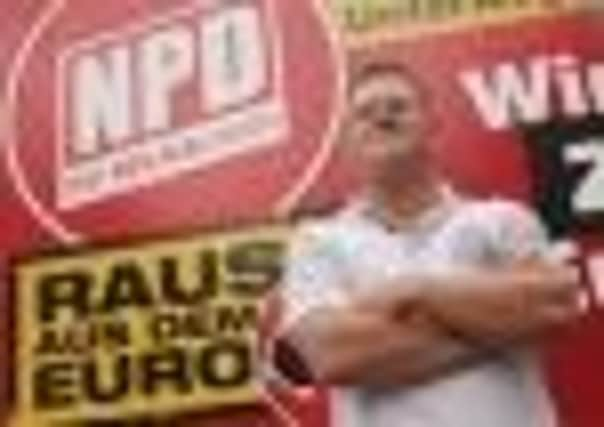Far-right party aims for centre stage


But the party’s leader insists he is taking his National Democratic Party mainstream.
“My aim is to make the NPD a party firmly based in the present and looking toward the future,” Holger Apfel said in an interview at a rally this week.
Advertisement
Hide AdAdvertisement
Hide AdAnd, breaking a far-right taboo, he said that Nazi Germany’s record during the Second World War included “crimes”.
Mr Apfel has tactical reasons for toning down his message – Germany’s federal government is considering a ban on the party. Yet the attempt to appeal to the centre has prompted anger in the country’s small but entrenched ultra-right movement.
Despite talk of change, it doesn’t take long for Mr Apfel to show flashes of xenophobia.
“We… have to ensure that Germany again becomes the country of the Germans,” he said. “We see the growing danger that the biological basis of our people will wither away because there’s an increasing mixing.”
He frowned when asked his feelings about the success of Marcel Nguyen, a half-Vietnamese gymnast who won two silver medals for Germany at the London 2012 Olympics.
“I can freely say it’s not something that causes me euphoria,” Mr Apfel said, before hastily adding: “But you won’t see us calling for the deportation of half-breed children.”
The government’s decision to consider an NPD ban follows the revelation last November that a neo-Nazi cell carried out a seven-year killing spree that left nine immigrants and a policewoman dead. Authorities have not been able to prove that the cell had direct support from the NPD.
However, key party officials have been linked to the group’s three core members, who evaded police for more than a decade despite being on the run for other crimes.
Advertisement
Hide AdAdvertisement
Hide AdA previous attempt to outlaw the party was rejected by the country’s highest court in 2003 and officials are treading carefully before deciding later this year whether to launch a new attempt to have the party banned.
Mr Apfel’s appeal to mainstream voters runs parallel to the emergence of several new German ultra-nationalist fringe groups on both sides of the NPD.
One calls itself “The Immortals”. It has staged night-time marches in small towns, protesting against what it regards as an excessive influx of foreigners threatening the racial purity of the German nation. Videos showing dozens of people wearing white masks and carrying burning torches have been uploaded to YouTube.
Despite their sophisticated online presence, The Immortals play a minor role compared with the so-called Autonomous Nationalists, according to Toralf Staud, a German journalist who has written extensively about the far right.
In August, more than 900 police officers raided homes and clubhouses belonging to Autonomous Nationalist groups in western Germany. They seized computer hard drives, weapons and far-right propaganda material – including 1,000 election posters for the NPD.
“This shows the close links between this right-extremist party and the neo-Nazi scene in North Rhine-Westphalia,” said Ralf Jaeger, interior minister of Germany’s most populous state.
Germany’s security services admit that although the number of registered members of nationalist parties is declining – the NPD had 6,300 members last year compared to 6,600 in 2010 – the number of violent far-right extremists is rising.